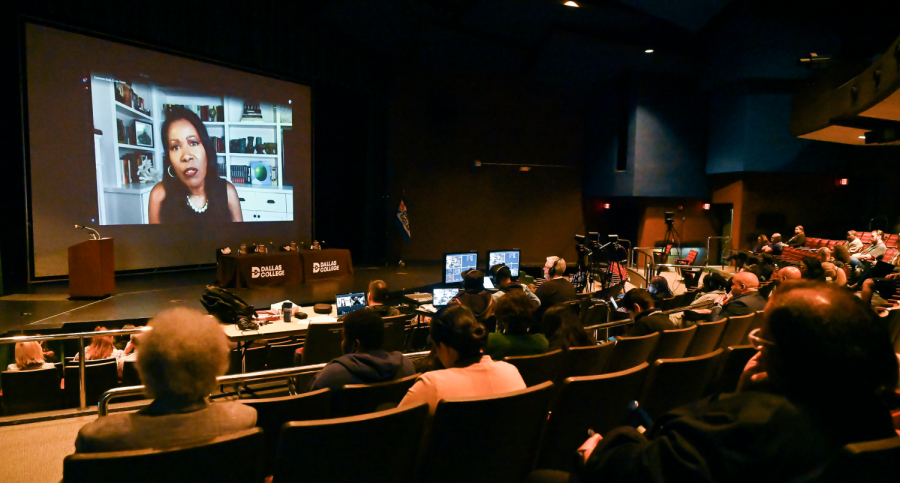Author Isabel Wilkerson dissects institutionalized racism
March 7, 2023
Isabel Wilkerson compares America to an old house. If you live in an old house you know that the work is never done. One day you might replace the refrigerator, but then two days later the toilet won’t flush. It requires constant work and vigilance to make improvements.
After a rainstorm the basement might flood, but not going into the basement doesn’t mean the problem isn’t there. It’s lurking beneath, waiting to be dealt with.
Wilkerson uses metaphors like this in her book “Caste: The Origins of Our Discontents” to help readers understand that racism hasn’t left the U.S.
The first African American to win a Pulitzer Prize for individual reporting, Wilkerson spoke about the issues Black Americans face every day at a virtual meet and greet hosted by Brookhaven on March 1, followed by a panel discussion with Dallas College faculty and administration.
“The first step is acknowledging that we do have a caste system in higher education, right?” said panelist Dominica McCarthy, associate dean of student success at Brookhaven. “Creating those safe spaces to have those honest conversations and helping people understand that it’s not about blame. It’s about stating what the reality is and then figuring out ways to get an understanding of each other and how we can come up with solutions together.”
“Caste” was chosen as Dallas College’s most recent common book. The program is meant to give readers on all seven campuses a common thread that transcends the different academic disciplinaries, ages, genders and races that otherwise might separate them.
“One of the things that we can do as educators is to be willing to talk about the topic,” English faculty Cheri Edwards said. “Talking about race in our classes is difficult. It’s difficult for students. I’m at Cedar Valley, and I find that a lot of my students have never talked about it … So, being willing to have the conversation in small increments where they are allowed the chance to ingest some of the things before we move on to the next part is important.”
“Caste” focuses on the idea that there is still a caste system in America, even if it is not actively supported or understood by most. Americanas are pitted against each other to maintain a higher status in society only to benefit the very few at the top.
“For so many people, there’s this feeling of, ‘I might not have it all, but at least I’m not at the bottom.’ And that’s the message of the caste system,” Wilkerson said.
During the question-and-answer portion of the meet-and-greet, Wilkerson was asked if there was a parallel between the caste system metaphor in her book and the mudsill theory coined by former U.S. Sen. James Hammond from South Carolina.
Hammond said that every society must find a class of people assigned to do the menial labor, and assigning this class based on race was the natural way to go. In other words, they are the mudsill, or the framing structure, on which the rest of society is built upon.
This theory was used as an argument to support slavery.
Wilkerson acknowledged the similarities between her caste system metaphor and Hammond’s mudsill theory. The difference, however, is her desire to destroy these ideas, while Hammond hoped to strengthen them.
“It takes a tremendous amount of effort to keep people down,” Wilkerson said. “And while you’re holding someone down, you’re not allowing yourself to rise in ways that we cannot imagine, and to transcend these divisions within our species.”
Conversations about racism, hate crimes, dehumanization and other stressing topics can be difficult to talk about when the same experiences aren’t shared by all.
Incorporating “Caste” into his curriculum has forced English faculty Timothy Cedor to find new ways to help students contribute to the conversation. Instead of waiting for a raised hand, he has students turn in discussion topics ahead of time and reads them anonymously so conversation can flow easily without fear or judgment.
“That allows them to get their voice into the conversation as well,” Cedor said. “And it’s one of the few times I actually sit down in the class. Now I’m not the expert in the room anymore. I’m somebody who needs to learn from the experts in the room.”
Wilkerson said she understands that much of the racism and issues today weren’t created by the current generation. However, pretending it doesn’t exist won’t help.
“Look deeply into history to make sure that it’s not repeated,” Wilkerson said. “That’s one of the things that I think is necessary to be able to push past this. To somehow transcend and overcome it. You cannot heal from what you have not diagnosed, you cannot fix what you haven’t named, and you cannot repair what you cannot identify.”





